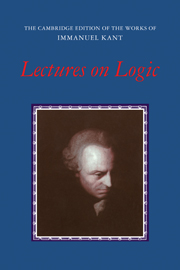Book contents
- Frontmatter
- Contents
- General editors' preface
- Acknowledgments
- Translator's introduction
- PART I The Blomberg logic
- PART II
- PART III The Dohna-Wundlacken logic
- Prolegomena
- Tractatio ipsa
- The doctrine of elements
- Doctrine of method
- PART IV The Jäsche logic
- PART V Appendixes
- Explanatory notes
- Name index
- Subject index
Tractatio ipsa
Published online by Cambridge University Press: 05 June 2012
- Frontmatter
- Contents
- General editors' preface
- Acknowledgments
- Translator's introduction
- PART I The Blomberg logic
- PART II
- PART III The Dohna-Wundlacken logic
- Prolegomena
- Tractatio ipsa
- The doctrine of elements
- Doctrine of method
- PART IV The Jäsche logic
- PART V Appendixes
- Explanatory notes
- Name index
- Subject index
Summary
Logic is the science that contains the formal rules and principles of thought. It is customarily divided into:
theoretical logic,
practical logic[;] but there is no such division, for in that case it would have to be applied to objects, which is not the case at all, however, for it contains only the formal rules of thought.
One can | divide | it rather into:
the doctrine of elements[; this] contains rules in general,
the doctrine of method[; this] contains the principles of science.
The doctrine of method is the complex of cognitions, insofar as they are made into a system { – It contains directions for the way in which a system of cognition is to be attained}. It constitutes the so-called practical part.
In the history of logic the most outstanding phenomenon is where it battled with itself as to whether any cognition is certain. He who believed that it could be completely proved was called a dogmatist, but the doubters were called skeptics. {Skeptics wanted to prove that one cannot attain certainty about anything at all, and thus they fell into contradiction with themselves – a cathartic, which annuls itself. – Their acuity, with which they attacked the scholastics, is admirable.} They were in the end a valuable sect. {Pyrrho was the earliest of all the skeptics – later Arcesilaus, Carneades.}
We have no one who has exceeded Aristotle or enlarged his <pure> logic (which is in itself fundamentally impossible) just as no mathematician has exceeded Euclid.
Information
- Type
- Chapter
- Information
- Lectures on Logic , pp. 438 - 439Publisher: Cambridge University PressPrint publication year: 1992
